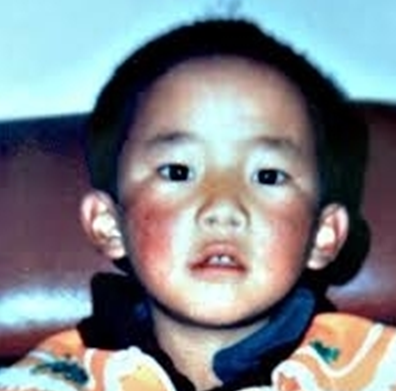Panchen Lama
(Created page with "{| class="wikitable" |- |colspan="0"|<div style="font-size:100%"> This is a collection of articles archived for the excellence of their content.<br/>You can help by converting...") |
|||
| Line 9: | Line 9: | ||
|} | |} | ||
| − | [[Category: | + | [[Category:Places|P ]] |
| − | [[Category: | + | [[Category:Religion| P]] |
| − | [[Category: | + | [[Category:Biography|P ]] |
[[Category:Name|Alphabet]] | [[Category:Name|Alphabet]] | ||
Revision as of 16:59, 11 March 2014
This is a collection of articles archived for the excellence of their content. Readers will be able to edit existing articles and post new articles directly |
Panchen Lama
World celebrates Panchen Lama’s 24th birthday but his whereabouts is still unknown
By Samten Choephel, Thursday, April 25, 2013
Leh: His Holiness the 11th Panchen Lama, Gedhun Choekyi Nyima was born on April 25, 1989 in Lhari County in U-Tsang, Tibet. He is the son of Konchok Phuntsok and Dechen Choedon. He was born three months after the death of 10th Panchen Rinpoche, who died suddenly and unexpectedly a few days after delivering a speech critical of Chinese policies in Tibet. The 10th Panchen Rinpoche had refused Chinese demands that he assume Dalai Lama's position after his exile and had steadfastly resisted to denounce him. He personally presented Mao Zedong with a 70,000 character petition with details of the suffering and persecution of Tibetans, which Mao later dubbed as "Poisoned Arrow" aimed at the heart of the Communist Party. Panchen Rinpoche was subjected to harsh "self-criticism" and "re-education" sessions, spent 10 years in a Chinese prison where he suffered from repeated torture and lived for eight more years after his release in 1981.
The Chinese government denied His Holiness the Dalai Lama's participation in a legitimate, traditional procedure for searching the Panchen Rinpoche's reincarnation. They appointed Chadrel Rinpoche of Tashi Lhunpo Monastery in Shigatse (the seat of the Panchen Rinpoche) to head a Chinese Communist Party-constituted committee to conduct the search. On 14 May 1995, Gedhun Choekyi Nyima was named the 11th Panchen Lama by His Holiness the XIV Dalai Lama. Soon after the announcement, the young boy was abducted by authorities of the People's Republic of China and has not been seen since 17 May 1995. The new search committee ignored the HH the Dalai Lama's proclamation and instead chose Gyancain Norbu as the 11th Panchen Lama on 11 November 1995 who the Tibetans refused to accept as their religious leader.
Gedhun Choekyi Nyima was 6 years old when he was detained by the Chinese authority along with his family. United Nation Human Rights Commission termed him "youngest political prisoner in the world". The whereabouts of Gedhun Choekyi Nyima are still unknown. Many international agencies and human rights organizations (including the United Nations) have tried to get access to him but their requests were turned down by the Chinese government. The Chinese officials said that his whereabouts are kept undisclosed to protect him. However, Tibetans and human rights groups continue to campaign for his release. The Regional Tibetan Youth Congres in Ladakh observes Panchen Lama’s 24th birthday by hoisting prayer flags, offering kangsol and other religious activities. They are going to organise a basketball tournament end of this month to create awareness amongst the Tibetans and the outside world. His birthday is day to celebrate and rejoice. However, RTYC will be observing the Release Day (Lotol) on 17th May through political activism and campaigns.
The Panchen Lama is said to be the incarnations of Amitabha Buddha. The title, meaning "Great Scholar", is a Tibetan contraction of the Sanskrit paṇḍita (scholar) and the Tibetan chenpo (great). The Panchen Lama traditionally lived in Tashi Lhunpo Monastery in Shigatse. The Panchen Lama is the second highest ranking lama in the Tibetan Buddhism. Therefore, he holds a significant political role in Tibet in the absence of Dalai Lama, who fled to India in 1959.
